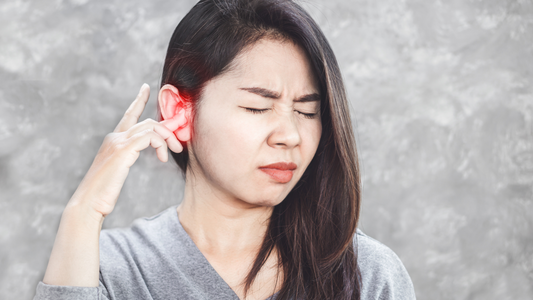Is Tinnitus a Disease?
While tinnitus is not a disease in itself, it is usually a symptom of an underlying condition. In fact, about 90% of people with tinnitus also experience some form of hearing loss. Noise-induced hearing loss is particularly common, especially among those who work in loud environments like construction sites, music venues, or factories. Although tinnitus can be incredibly disruptive, it generally doesn’t cause any physical harm. However, the constant noise can make it difficult to concentrate, communicate effectively, or even relax. This disruption can lead to sleepless nights, decreased productivity at work, and strained relationships with friends and family.Understanding what triggers tinnitus matters when managing it. Tinnitus itself isn't a disease, but it's tied to other issues. Loud noise is a big culprit – think rock concerts, fireworks, or noisy workplaces. Have you experienced that ringing after a loud event? That’s a glimpse into noise-induced tinnitus.
Medications are another trigger. Some antibiotics and cancer treatments can cause or worsen tinnitus, especially at higher doses. Notice any ringing after starting a new medication? That could be why.
Aging also plays a part. As we get older, hearing can decline, sometimes bringing tinnitus along for the ride. Illnesses like Meniere’s disease or cardiovascular problems are also linked. Conditions like high blood pressure or diabetes can raise the risk too.
And don’t overlook earwax. Excess earwax can block the ear canal and lead to temporary tinnitus. Usually, once the wax is cleared, the ringing stops.
Head and neck injuries can also spark tinnitus. Muscle spasms near the ear might cause temporary buzzing too.
So, what's your trigger? Identifying it may not make the noise stop, but it can help you handle it better.
Is Tinnitus a Disease?
Tinnitus itself isn't a disease; it's usually a symptom of something else. About 90% of people with tinnitus also have some form of hearing loss. Noise-induced hearing loss is particularly common, especially among those working in loud places like construction sites, music venues, or factories. Though tinnitus can be disruptive, it generally doesn’t cause physical harm. But the constant noise can make it hard to concentrate, communicate, or relax. This can lead to sleepless nights, lower productivity at work, and strained relationships.The Link Between Hearing Loss and Tinnitus
Having hearing loss and tinnitus often go hand in hand, but one doesn’t cause the other. So what's the connection?
With hearing loss, your ears get less stimulation from environmental sounds. This lack of external noise can make the internal sounds of tinnitus, like buzzing or ringing, stand out more.
Less stimulation means reduced nerve activity in the ear. Still, signals from the damaged area of the ear travel to the brain's auditory system. These signals are often perceived as ringing, buzzing, or clicking sounds.
How Can Hearing Aids Assist with Tinnitus?
If you've got both tinnitus and hearing loss, hearing aids can really make a difference. These devices amplify the noises around you, which helps mask the internal ringing. It can feel like going from a loud, constant buzz to something much quieter—or even silence—just by wearing a hearing aid.
My dad dealt with that relentless ringing for years. When he started using hearing aids, it was like someone turned the volume down on his tinnitus. Now he can join family conversations without getting sidetracked by the noise.
Using hearing aids in both ears is crucial, even if you only hear tinnitus in one ear. Wearing them consistently is also key. By making it a daily habit, you can keep that relief going and lower the chances of the tinnitus coming back.
The Link Between Hearing Loss and Tinnitus
Worried about how hearing loss and tinnitus connect? When your hearing starts to fade, those internal sounds like ringing and buzzing become more noticeable. This happens because the usual background noises aren't there to drown them out.
Think of sitting in a room where the ambient sound suddenly cuts out. Any small noise gets much louder, right? That's what it's like with hearing loss and tinnitus. The fewer sounds you hear from outside, the more your brain starts to 'fill in the gaps' with those internal noises.
I had a family member who dealt with this for years. It was exhausting, that constant noise in his head. But after getting hearing aids from HearWell Group, he felt a real change. Not only did his hearing improve, but the tinnitus became much less intrusive. Amplifying outside sounds helped quiet the inside ones.
If you or someone you know has both hearing loss and tinnitus, hearing aids might be worth considering. They might not get rid of tinnitus entirely, but they can definitely make it more manageable, helping you enjoy life a bit more.
Order Affordable Hearing Aids Today
Are you tired of the constant ringing in your ears? It's time to take action and find relief. At HearWell Group, we make it easy for you to get the hearing aids you need without breaking the bank. Our hearing aids are designed to improve your hearing and reduce the effects of tinnitus, bringing back the peace and quiet. Enjoy waking up to the sound of birds or chatting without the constant distraction of tinnitus. Our hearing aids come with the latest technology to make those irritating noises less noticeable. I know someone who struggled with her favorite hobby due to constant buzzing, and after getting hearing aids, her days became more enjoyable and evenings more restful. Why wait any longer? Explore our wide range of hearing aids that fit various needs and budgets. With rechargeable options, you'll also save on battery costs. We are committed to providing quality products and excellent customer service because better hearing should be accessible to everyone. Visit HearWell Group today to see how our hearing aids can make a meaningful difference in your life.Take the Next Step Towards Clearer Hearing
Do you dread the constant buzzing in your ears? It doesn't have to be that way. Imagine enjoying your favorite tunes without the noise or a quiet evening without the ringing. That’s what HearWell Group aims to offer. Why let tinnitus take over your life when there’s a practical, affordable solution? Try our hearing aid and see the difference. Remember my friend who found peace with a small hearing device? That relief could be yours too. Don’t wait—check out the options and find the hearing aid that suits you best.Sources & References
- Conlon, B., Langguth, B., Hamilton, C., Hughes, S., Meade, E., Connor, C. O., ... & Vanneste, S. (2020). Bimodal neuromodulation combining sound and tongue stimulation reduces tinnitus symptoms in a large randomized clinical study. Science Translational Medicine, 12(564). https://www.science.org/doi/10.1126/scitranslmed.abb2830
- Hoare, D. J., Edmondson-Jones, M., Sereda, M., Akeroyd, M. A., & Hall, D. (2014). Amplification with hearing aids for patients with tinnitus and co-existing hearing loss. Cochrane Database of Systematic Reviews, (1). https://www.cochranelibrary.com/cdsr/doi/10.1002/14651858.CD010151.pub2/full
- Tunkel, D. E., Bauer, C. A., Sun, G. H., Rosenfeld, R. M., Chandrasekhar, S. S., Cunningham Jr, E. R., ... & Whamond, E. J. (2014). Clinical practice guideline: tinnitus. Otolaryngology–Head and Neck Surgery, 151(2_suppl), S1-S40. https://journals.sagepub.com/doi/full/10.1177/0194599814545325
- Baguley, D., McFerran, D., & Hall, D. (2013). Tinnitus. The Lancet, 382(9904), 1600-1607. https://www.thelancet.com/journals/lancet/article/PIIS0140-6736(13)60142-7/fulltext

The Hear Well Group Research Team: Trusted Hearing Health Insights
Our experienced research team compiles hearing health data from credible, peer-reviewed sources and presents it in easy-to-understand terminology. We ensure accuracy and trustworthiness, providing up-to-date, evidence-based recommendations to enhance hearing care practices and inform our readers' hearing well-being decisions.

